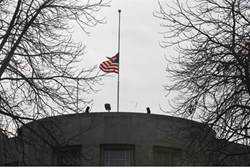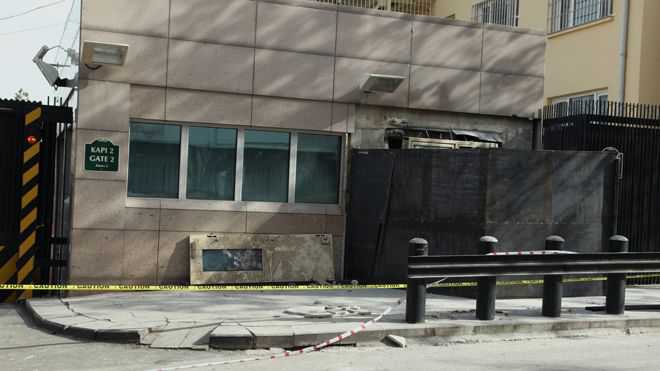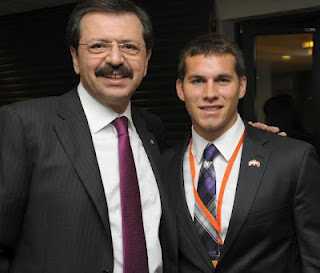Emergency personnel are seen on Friday in front of a side entrance to the U.S. Embassy in the Turkish capital.
ISTANBUL — “Have you heard the news?” my editor at the local Turkish newspaper asked. Lazily clicking through various media outlets’ homepages as I shouldered the phone to my ear, I assumed he was referring to the still-missing New Yorker in Istanbul.
“Yeah, but the investigator hasn’t —”
“No, not Sierra,” he interrupted. “The U.S. Embassy was bombed this morning.”
I immediately jumped on Twitter, where I watched and retweeted as developments unfolded. First, news of a blast near the embassy in Ankara. Then, photos of the damaged front entrance. After that came 140-character blurbs reporting several injuries, a suicide bomber (or was it a package?) and one, no, two deaths.
The distance between Ankara and Istanbul, where I live, is more than 200 miles. But I felt a world away as I drank my latte, watched two boys rough-house in the street and wrapped up another story on the investigation into Sarai Sierra’s mystifying disappearance.
Meanwhile, my American cellphone has not stopped buzzing since 3:30 p.m. I’ve received dozens of Facebook messages and e-mails from concerned family members and friends back home. As I rushed to meet my daily deadline, I put my phone on silent.
After filing, I cautiously opened my inbox. My heart sank — three messages from mom. I knew what they said before I read them.
“IMPORTANT!!” shouted the first subject line. I took a deep breath before clicking it open. As I read the message interspersed with exclamation points and phrases in all caps, I could hear her frightened voice and see her furrowed brow.
Let me add an important aside: Mom’s been trying to get me to come home since I moved here two years ago. The oldest of three daughters, I was the first in my immediate family to go to college and the first to travel abroad. She had no idea I was going to end up living in Turkey when I hugged her goodbye in January 2011. Neither did I.
She and my sisters traveled to Istanbul this past summer and, as I did when I first stepped off the plane, fell in love with the city and its storied history, generous people and distinct cuisine. But that hasn’t stopped my mom (and many of my family members, for that matter) from sending frantic messages every time a protest occurs or bomb detonates, not just in Turkey but anywhere in the region.
As much as I hate to admit it, she’s got a point.
According to the Pew Research Center’s 2012 Global Attitudes Project, only 15 percent of Turks have a favorable opinion of the United States. Conversely, 72 percent view the United States unfavorably.
In the past, I’ve been able to alleviate my chronically worried mother’s fears about my safety by pointing out that none of our governmental buildings had been targeted recently, as has happened in the Arab Spring countries. Perhaps, in retrospect, that wasn’t the greatest example I could have given.
After all, this isn’t the first time a U.S. diplomatic mission has been attacked in Turkey.
In 2008, six people were killed when gunmen attacked Turkish police guarding the entrance to the U.S. Consulate in Istanbul. Only five years before that, an al-Qaeda-linked gang of Turks killed 58 people in various suicide truck bombings around Istanbul.
As my mom reminds me every day, Turkey also is in a geopolitical hot spot.
Think of what’s happened in the past two years alone — social and political upheaval has swept the Middle East and North Africa; Syria is riddled with conflict; already tense relations between the United States and Iran have deteriorated; four people were killed in an attack on an American diplomatic post in Benghazi, Libya, etc.
But do I worry about my safety in Istanbul? Honestly, other than frequent harassment, no. Perhaps it sounds naïve, but those concerns don’t match my reality here. It hasn’t affected my daily life.
And it hasn’t, at least until now, stopped others from visiting Istanbul, consistently ranked among the world’s most popular tourist destinations.
I pumped out a quick message, knowing my mother’s anxiety would not subside until she heard from me. “Hey mom, I’m fine. Promise I’m being safe. Just sitting in a café, writing.”
Less than a minute later, my inbox chirped. “OK, love you.”
via Making sense of the Ankara embassy bombing from Istanbul.
 As a result of a February raid in Istanbul and the northeastern city of Corlu, police had arrested 12 people, including eight Turks, two Azeris and two Chechens, and seized 22 kilograms of explosives, CNNTurk reported.
As a result of a February raid in Istanbul and the northeastern city of Corlu, police had arrested 12 people, including eight Turks, two Azeris and two Chechens, and seized 22 kilograms of explosives, CNNTurk reported.



